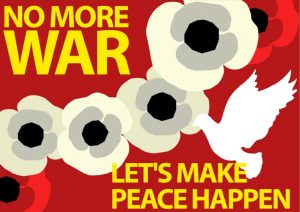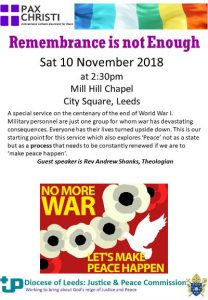WWI – Remembrance is not Enough (2)

Last month Tim Devereux wrote why he thought that ‘Remembrance is not enough’. One main point is that it is right to remember all the military killed in conflict, but we must also remember all the civilians who have been killed and all those whose lives have been shattered because of conflict. In our own time all those refugees fleeing the conflict in Syria and the Rohingya Muslims fleeing oppression in Myanmar are just two examples.
 Moreover, just because there has been a declaration of an end to hostilities in a conflict does not mean that there is ‘peace’; far from it.
Moreover, just because there has been a declaration of an end to hostilities in a conflict does not mean that there is ‘peace’; far from it.
At the end of the First World War the punitive reparations demanded by the Western Allies resulted in the great hardship endured in Germany in the 1920’s which led, ultimately, to the rise of Nazism and the horrors of the Second World War. Learning lessons from this, the Marshall Plan ensured that there was no repeat of this situation in the period following the end of World War II. It is a sign of hope that, sometimes, we can learn lessons from history (Something that seems particularly relevant in 2018).
We often talk about ‘building the peace’ and this is another reason why remembrance is not enough. So many people are traumatised by conflicts that some are never able to achieve a fulfilling life again whilst for others it may take the rest of their lives. This is one element, at a personal level, of building the peace. Peacemaking, something that Jesus singles out in his Sermon on the Mount, is a process – an ongoing set of actions. It is the responsibility of all of us who call ourselves Christians. What does that mean we have to do? Well, it is no accident that within the Catholic Church the word ‘Peace’ is so often accompanied by the word ‘Justice’. This is because the Gospel of Jesus points us to working for Justice as the way to engage in this process of ‘peacemaking’. Our religion obliges us to involve ourselves in civil society to ensure that the foundations of peace – just laws, structures, ways of working and supporting the poorest in our society – are ones that are enacted through public policy.
To help explore some of these wider aspects of Remembrance and peacemaking the Commission is working with the Leeds Pax Christi group. Towards the end of September we will be publishing a short booklet with some liturgical suggestions for exploring these wider aspects and with some prayer suggestions for use around the time of Remembrance Sunday.
 ‘Remembrance is not Enough’ is also the title of a special service that the Leeds Pax Christi group is organising to take place on Saturday 10 November in the centre of Leeds at Mill Hill Chapel on City Square near the station.
‘Remembrance is not Enough’ is also the title of a special service that the Leeds Pax Christi group is organising to take place on Saturday 10 November in the centre of Leeds at Mill Hill Chapel on City Square near the station.
The service itself will take about an hour and the guest speaker will be the Rev Andrew Shanks, well-known Anglican theologian who, many years ago, was a key member of the Leeds Inter-church peace group.
Click on the image to download a PDF Flyer to print out and advertise in your community.
*****************************************
